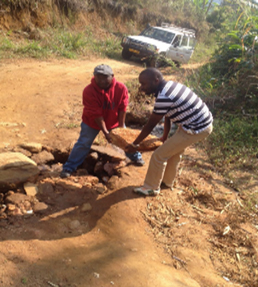Getting to Mihale Dispensary is no small undertaking. Located high in the hills of eastern Tanzania’s Morogoro Region, the health facility is located miles from the district health office, and is a challenge to reach even by car or motorcycle. While the dispensary sees more than 30 patients a day, visitors from the greater outlying region are few and far between, meaning less on-site support, less training, and fewer mentorship opportunities.
Tanzania’s predominantly rural population depends on remote facilities like the Mihale Dispensary to provide for their basic health needs. Recognizing the importance of regular support and guidance at such locations, President’s Malaria Initiative-funded MalariaCare and Tanzania’s National Malaria Control Program support supervisors to bring outreach training and supportive supervision to even the hardest to reach facilities. Such measures allow local health care workers and their district supervisors to work face to face to improve the quality of malaria case management.
For the district supervisors who ultimately visited Mihale Dispensary, this meant a long journey over rough terrain and dirt roads – but in the end, everyone agreed it was worth their while. “I never thought it would be possible to visit areas like Mihale Dispensary,” said one of the supervisors. “With this support, we can reach many hard to reach areas and provide support to health providers who were left for many years without supervision.”
While on site, National Malaria Control Program staff worked with dispensary employees to provide guidance on performing malaria rapid diagnostic tests, providing quality care, and properly administering malaria treatments. “I have not received supportive supervision for the past four years,” Mihale Dispensary’s head medical attendant told the team. “I am happy you have visited this facility. It was my wish to receive supportive supervision so I can get feedback on how well I am attending to patients.”
This story was taken from www.malariacare.org.

